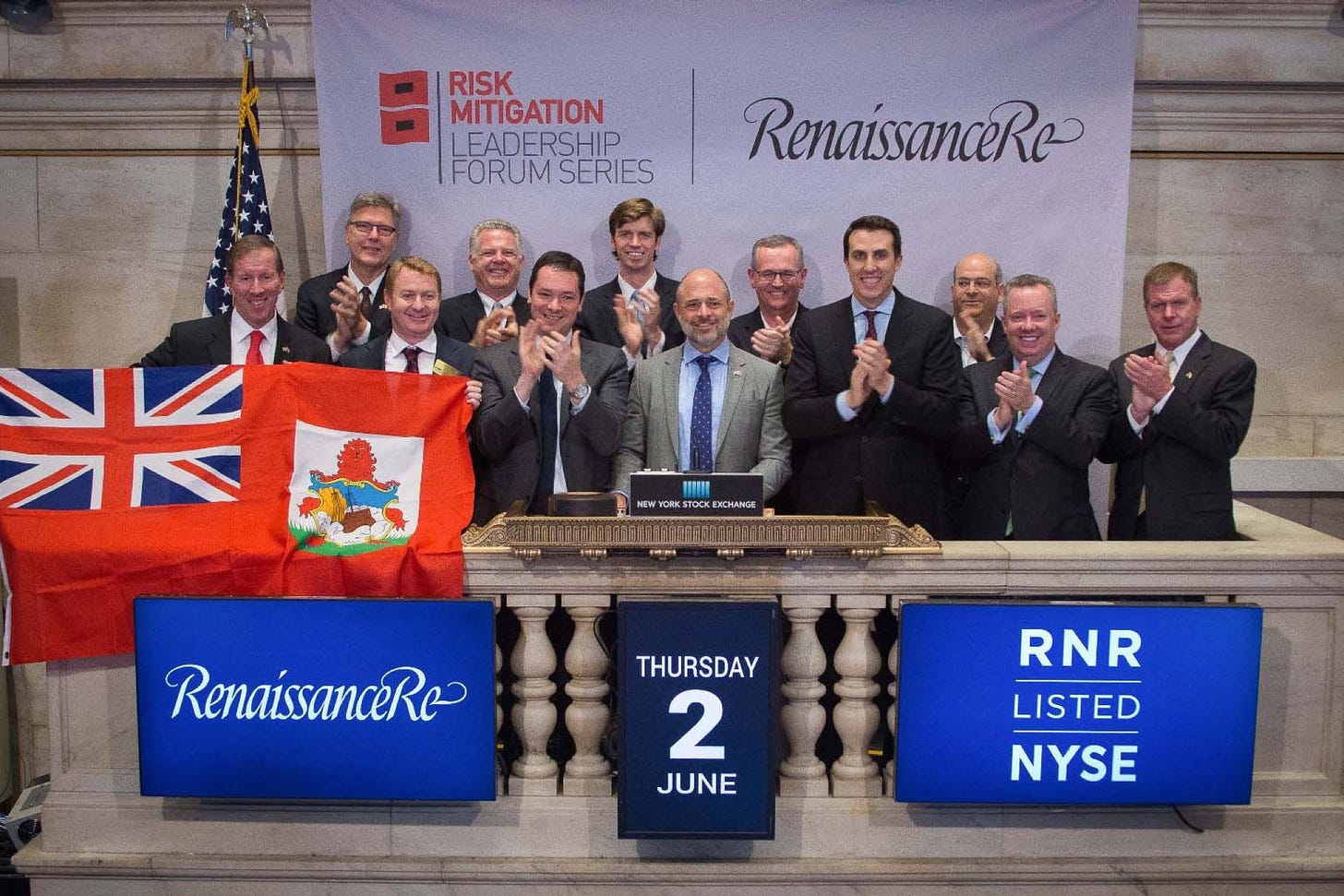Ron DeSantis and the Florida Legislature could reduce insurance rates right now. A giant insurance company is standing in the way.
Lawmakers have a way to save Florida homeowners $150 a year but State Farm doesn't like it

This is Seeking Rents, a newsletter devoted to producing original journalism — and lifting up the journalism of others — that examines the many ways that businesses influence public policy across Florida, written by Jason Garcia.
In January, Gov. Ron DeSantis and the Florida Legislature had a chance to save money for Florida homeowners who are struggling to afford the soaring cost of property insurance.
Members of a key committee in the Florida Senate were presented with a plan that could have cut the price of homeowner’s insurance by an estimated $150 a year. And it would have done so without simultaneously imposing hidden costs on homeowners — like insurance policies that won’t cover the cost of replacing a roof or legal changes that make it much harder to fight back against a big insurer in court.
The plan involved expanding a public insurance fund known as the “Florida Hurricane Catastrophe Fund.” And it had support from a broad spectrum of industry interest groups and a bipartisan coalition of elected officials.
But the Big Business lobby hated it.
“We need to focus on other places that we can make some changes,” Adam Basford, a lobbyist for the Associated Industries of Florida, told the senators on the committee.
The Florida Chamber of Commerce went even further. It warned senators that it would punish anyone who voted for the plan by severely penalizing them on its annual post-session “report cards.”
The blockade worked. Senators abandoned the plan without even voting on it. And DeSantis — a governor who is plenty willing to jump into legislative fights when he cares about the issue — never said peep.
The episode illustrates the behind-the-scenes influence of a handful of big insurance companies that don’t want Florida to expand its Cat Fund — particularly State Farm, the nation’s largest home and auto insurer and a company that spent more than $400,000 last year on lobbyists in Tallahassee and another $400,000 more on campaign contributions (via political committees funded by its agents).
It also serves as a warning as DeSantis orders state lawmakers back to Tallahassee later this month for a special session to “stabilize” the state’s troubled insurance market, where some insurance companies are going under and the rest are jacking up rates or cancelling policies altogether.
Because while there are some genuinely pro-consumer steps that DeSantis and the Legislature could take this month to help Florida homeowners, they have so far proven unwilling to take them.
And there are a bunch of other steps they might take instead in the name of “reform” that leave consumers paying more money for worse insurance and with less recourse to fight back against an unfair insurer — steps that line up a lot better with the lobbying agendas of insurance companies like State Farm.
Understanding the ‘Cat Fund’
Let’s stipulate something right from the jump: In Florida — a 450-mile-long peninsula sticking out into the Atlantic Ocean at a time when the climate is warming, sea levels are rising, and storms are becoming more frequent and more intense — there are no easy solutions when it comes to keeping property insurance adequate and affordable.
But the Florida Hurricane Catastrophe Fund is a pretty good one.
Created in November 1993 to stabilize Florida’s insurance market following the destruction of Hurricane Andrew, the state “Cat Fund” sells reinsurance to insurance companies. That’s insurance that they buy to protect themselves from financial ruin following a major disaster that leads to lots of claims all at once.
The Cat Fund is intended to be a cheaper source of reinsurance, which is a major expense for property insurers — an expense that gets passed on to consumers.
Insurance companies pay premiums to buy reinsurance from the Cat Fund. But unlike private reinsurance companies, the Cat Fund doesn’t build a profit margin into its rates. It’s exempt from taxes. And if it runs out of money to pay claims, the Cat Fund can simply borrow money and levy a tax on insurance policies to pay off that debt.

By some estimates, the price of reinsurance through the Cat Fund right now is one-third the price of reinsurance on the private market.
But there’s a catch. Just like a homeowner must pay a deductible before their insurance policy kicks in, an insurance company must pay a deductible before their Cat Fund reinsurance policy kicks in. And the size of the Cat Fund deductible has nearly doubled over the past 17 years.
Every company that buys reinsurance through the Cat Fund has its own deductible, which is based on variables such as the number of policies they have. But all of those deductibles add up to a cumulative total that is typically referred to as the Cat Fund’s “retention” point.
In 2005, the Cat Fund’s retention point was $4.5 billion. Today, it’s more than $8 billion.
In other words, in broad terms, property insurers in Florida must cover more than $8 billion in losses in a year themselves before they can tap into the reinsurance they bought from the Cat Fund.
Here’s why that’s a problem: While deep-pocketed national insurance companies like State Farm once dominated Florida’s home insurance market, they have pulled way back in recent years and been largely supplanted by much smaller, Florida-based insurance companies.
Those smaller companies don’t have the cash on hand to cover billions of dollars in losses themselves. So they have to buy private-market reinsurance to cover their Cat Fund deductibles.
And the price of reinsurance in that range — where private reinsurers don’t have to compete with the Cat Fund — is soaring, driven in part by disasters ranging from the California wildfires to the Covid-19 pandemic
A simple(ish) solution
The solution here seems obvious, right? Lower the Cat Fund deductible. Let insurance companies buy public reinsurance that they can tap into sooner and after smaller storms.
That’s exactly what Sen. Jeff Brandes, a Republican from St. Petersburg and the Cassandra of Tallahassee when it comes to property insurance, tried to do this past session
He proposed an amendment to a piece of insurance legislation during a Jan. 27 meeting of the Florida Senate’s Appropriations Committee that would have done two things:
First, it would have lowered the Cat Fund retention point back down to $4.5 billion — the threshold it was set at in 2005.
Second, it would have temporarily eliminated an extra charge that insurance companies must pay into the Cat Fund that was initially created to help build up the fund’s balance more rapidly. Supporters argue that the charge is unnecessary right now, because the Cat Fund has enough money to pay all potential claims it could face in a year.
Brandes — who A) knows as much or more about property insurance than anybody else in the Florida Legislature right now and B) is one of the very few Republican legislators unafraid of bucking the Legislature’s leadership — estimated his proposal would immediately save $150 a year for every Floridian with a home insurance policy.
But Senate Budget Chair Kelli Stargel, a Republican from Lakeland and one of Senate President Wilton Simpson’s top lieutenants, pressured Brandes into withdrawing the amendment.
The other options are much worse
To be very clear, expanding the Cat Fund isn’t a consequence-free idea. It would expose the state to more financial risk should another major hurricane — or series of hurricanes — hit the state.
If that were to happen, Floridians would ultimately be forced to pay up through an extra charge that would be tacked onto almost all property and casualty insurance policies — home insurance, car insurance, renter’s insurance, boat insurance and more.
(That’s almost all: In one of the countless special-interest favors that pockmark Florida’s laws, businesses would be exempt from paying this emergency tax on workers compensation insurance and doctors would be exempt from the tax on medical malpractice insurance. See: 215.555(6)(b)1.)
That potential “hurricane tax” is what big-business front groups like the Florida Chamber of Commerce tend to invoke when attacking proposals to expand the Cat Fund.
But think about what they’re lobbying lawmakers to do instead:
They want to “deregulate” insurance policies, which really amounts to letting insurance companies sell worse insurance — policies with higher deductibles or that won’t cover the full cost of repairs.
They want to drive rates up at Citizens Property Insurance Corp., the state-backed insurance company that is now where nearly 1 million Floridians get their insurance. That would be a direct tax increase on Floridians covered by Citizens — and an indirect tax increase on everyone else, because the main reason the insurance industry wants to raise Citizens’ rates is so that private insurance companies can charge more themselves without losing customers to Citizens.
And they want to make it harder than ever to sue an insurance company, in part by making such lawsuits less lucrative for attorneys. This is what DeSantis seems most eager to do, based on his proclamation calling the special session. But clamping down on lawsuits isn’t a consequence-free decision, either. Look, it is indisputable that there are lawyers, roofers and others out there who have been ginning up questionable claims against insurance companies. But DeSantis and lawmakers have already passed two big insurance-related lawsuit bills in just the past three years, and Florida’s big-business lobby has a long history of pushing “tort reform” that goes far beyond cracking down on bad actors. And good luck fighting back against an insurance company that won’t pay your claim if you can’t find a good lawyer to take your case.
By comparison, the biggest negative externality of expanding the Cat Fund is the possibility — the possibility — that Floridians may have to pay higher taxes down the road after a major storm season. And lawmakers could take steps to blunt this risk — for instance, by putting extra general revenue into the Cat Fund, just like they used Covid relief money from the federal government to offset the budget impact of eliminating the state gas tax for one month.
Or maybe DeSantis and the Legislature could eliminate those tax exemptions for workers’ comp and medical malpractice insurance. The medical malpractice exemption, for instance, was passed in 2004 — and was only supposed to last for three years.
The company behind the curtain
During that Jan. 27 Senate meeting, a lobbyist for the Florida Chamber revealed the real reason big insurers don’t want the Cat Fund expanded.
“The Cat Fund, like Citizens Property Insurance, competes with the private market," Chamber lobbyist Carolyn Johnson told senators.
It all comes down to ensuring an advantage for the big guys.
The deep-pocketed national insurance companies (who don’t need to buy reinsurance below the Cat Fund’s retention point) want to force smaller competitors (who do need to buy reinsurance at that point) to continue paying higher private-market prices. And private reinsurers don’t want more competition from the Cat Fund that would force them to bring down their own rates.
It's worth asking yourself at this point who the Florida Chamber of Commerce actually represents.
Last month, the chamber hosted a three-day “Insurance Summit” at the Tampa Marriott Water Street hotel. (The agenda of this “summit” included political fundraising receptions for Republican Sen. Jim Boyd of Bradenton and Republican Rep. Blaise Ingoglia of Spring Hill, who preside over key insurance committees in the Legislature).
Check out the three biggest sponsors:
There’s State Farm, a company so big that it ranks 39 on the Fortune 500 and did nearly $80 billion in revenue last year.
Then there’s RenaissanceRe, a Bermuda-based reinsurance company — which is partially owned by State Farm.
And there’s the National Association of Mutual Insurance Companies — a trade group that represents State Farm.
If Ron DeSantis and the Florida Legislature let the Florida Chamber of Commerce drive the agenda at this month’s special session, they’ll ultimately be taking orders from State Farm.






Hi Jason - I operate a customer-owned insurance exchange in Florida. There is some merit to the notion of reducing the deductible for the FHCF. The FHCF was relatively flush, starting the year with >$10B of surplus, and it would reduce expenses for insurance companies which could then be required to be passed on to consumers. The lower layers of the reinsurance programs - the ones with the smallest deductibles that are most likely to get hit - were very very expensive this year. The state did something along those lines with the RAP layer, which made additional reinsurance limit available below the deductible of the FHCF. The RAP program, however, is very small relative to the overall FHCF.
One big issue with extending coverage below the current FHCF limits is that it exposes the state to a lot more risk. Even now, the FHCF will have a big loss, if Irma hit again this year the FHCF estimates it would have cost it $7.8M. Ian is significantly larger than Irma, so it's entirely possible that, even without the change that you are advocating for, the FHCF will exhaust its' surplus this year because of Hurricane Ian. If they had lowered the retention by another $3.5B that would almost certainly move FHCF surplus to zero.
The FHCF is a pretty key component of the reinsurance strategy for most companies writing in Florida, and without it, rates will be much higher, especially now that interest rates are high and raising more money is difficult for insurance and reinsurance companies. If it's insolvent or it's credit is impaired, it will have a big impact the solvency of all the insurance companies that buy reinsurance from it (every company in Florida).
In retrospect the lawmakers in Florida look wise for not following the course set in this article.
A real fix is to eliminate one way attorneys fees, which are inflating premiums in Florida by about 2x. Florida is about 8% of homeowners claims in a given year and about 80% of homeowners insurance lawsuits. Other states that have significant hurricane exposure - Texas, Louisiana, South Carolina, etc. have lower rates, largely because they have avoided the massive litigation abuse where customers sue insurance companies to get new roofs when they are simply worn out, not when they were impacted by a catastrophic storm. Very little of the money that gets paid by insurance companies into those scams ends up with the consumer, it mostly gets captured by the attorneys, public adjusters and roofer who are initiating that fraud.
Interesting article, but written by someone with very little knowledge about how the insurance and reinsurance works particularly as it relates to the very unique Florida market place. I have been in the reinsurance industry for over 45 years ( specializing in Florida for 30+ years). The Florida insurance market is unique in a number ways, there are solutions, but there are no experts employed by the state in reinsurance that can put them on the right track…..and asking a reinsurer or reinsurance broker who have vested interests in certain outcomes is not the answer